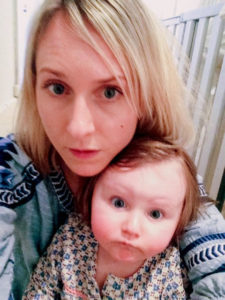Emma Gawne, an experienced baby and child sleep expert shares with us her newborn sleep tips:
There is nothing more incredible than the moment you are handed your newborn baby.
It is a moment of pure joy, of pure intoxicating love. This little person who you have been carrying round in your womb for the last 9 months is finally here.
You may have spent the last 40 weeks trying to discover as much as you can about how to care for your newborn, but the reality is however, much you try and learn nothing can really prepare you for that moment. Suddenly you have a little person who is totally and utterly dependant on you in every possible way. For many mums this can be totally overwhelming and can often leave you feeling quite anxious at times. Not only are you left trying to work out how on earth to feed your new bundle of joy but how to comfort them and invariably settle them to sleep.
Sleep and the First Few Weeks
In the very early days it may seem like your new baby has their days and nights muddled up and this is more than often because he does! You can help them early on to set their 24-hour clock, so it becomes more like yours by enabling them to distinguish the difference between night and day. A great way to do this by exposing them to plenty of sunlight during the day (particularly the afternoon sun) and then at night time ensure that the lights are dimmed, and noise is kept to a minimum.
In the first weeks / months of your new baby’s life they will spend most of their time asleep unless they are being fed, winded or changed. As a gentle guideline, I always suggest to parents that their new baby is awake for no longer than 45 minutes to an hour at a time. As tempting as it seems in the 4th trimester your baby really doesn’t need to be stimulated other than the cuddles and gentle interaction that he will enjoy with you.
It is also important, not to have any expectations of your new-born when it comes to their sleep. Because their tummies are so small when they are born they will have to feed little and often so will sleep in small 2-3 hour stints with slightly longer periods at night. As they grow and become stronger towards the end of the first six to eight weeks you will notice that the time they are able to sleep overnight increases – this is primarily down to the fact they now have a bigger tummy which will sustain them for longer but they also are producing enough melatonin to enable them to sleep for longer periods of time at night.
Your Sleep During the Early Weeks
When you can try and sleep during the day while your baby sleeps and if you have a partner who is able to give the first night feed this can also really help in allowing you to have a longer period of sleep before the next feed. If for some reason you are unable to sleep during the day then you can always try this exercise which is used by world leaders and CEO’s. It is said to be the equivalent of having 1.5 hours sleep.
Lie down on your back, knees bent, arms out to the side and breathing in through your nose and out through your mouth remain in this position for 10 minutes.
What To do If your Newborn is not Sleeping
If you baby is feeding well at the beginning and is not unwell or suffering from other health issues, then he should be able to fall asleep and stay asleep for several hours. If, however he isn’t and isonly sleeping for 15 minutes stints then are several things that you can do to try and improve the situation. Firstly, it is important to ensure that your baby is getting adequate food. It will takeabout 6 weeks to establish your supply of breastmilk and it is important that you look after yourself during this period as much as possible by eating a really good diet. Also if you think your supply is low you can take brilliant tinctures such as the Alfafa complex tincture from the Organic Pharmacy. If you are bottle feeding your baby and you think that they are not getting enough food, you may want to consider switching them on to another more filling formula.
As well as ensuring your baby is nice and full after every feed so that they are able to fall asleep, it is also important to ensure the environment in which your baby sleeps is conducive to sleep. Over stimulation during the day and at night will prevent your baby from falling asleep and often it is this inability to sleep that people mistake for colic as sensory overload and over stimulation mimics it. If possible, try to have your baby in your room in either a cot or a co-sleeper and at night time keep the lights down low and keep your conversation to a minimum.
One of the best things you can do to help to calm your new born baby it is to swaddle them as this helps to recreates the cosy space that they had in the womb. Swaddling also helps prevent the startle reflex which is often the reason why they wake up suddenly after 15 minutes.
During the first three months touch is also a very powerful calming tool. By touching our babies or allowing them to touch/ suck themselves at night time we help to enhance the release of oxytocin hormones which puts them in a good mood and helps them build up tolerance to stressful situations.
Be aware though some new-born babies don’t like to be gently stroked as this can agitate them so when comforting your baby, I recommend touching more firmly or patting. A hand on a fractious baby who seems to be fighting sleep is often brilliant as it helps to make them feel contained. You may also like to cup their face with your hand and you can also put your check against their face too.
Sound is another powerful settling tool as your baby can hear even before they are born, and they are used to hearing the swishing sound of the blood running through your arteries. This noise is the equivalent to pink noise and there are lots of amazing apps and gadgets which you can use to recreate this noise to help your baby settle.
My favourite is the Whisbear, which not only mimics the sounds he would have heard whilst in your womb but it also has a cry sensor that comes on every time you baby cries effectively helping him transition to the next sleep stage.
Your voice is also equally powerful as they would have a heard this while they were inside along with any soothing music that you may have been listening to whilst pregnant. One thing is clear though your baby prefers the human voice over all sounds and most of all yours. So, when your newborn is struggling to settle it can be very effective to sing to them or talk to them in a calm and understanding way.
Your smell is also very effective when it comes to soothing them and inducing sleep. I often used to place a small amount of breastmilk on a muslin and place it in my babies’ cots. If you aren’t breastfeeding, then you can transfer your own smell by sleeping with a muslin in your bed for a few days or wearing it down you top.
Did you know that your newborn baby can recognise your face an hour after birth? This is great news as it means that he is able to pick up on your facial expressions from day one. With this in mind, it is important to remember that you are your babies mirror, so you need to be demonstrating to him that you are calm and happy as opposed to distressed and anxious. If at any time when calming your newborn, you feel these emotions either hand him to someone else or leave them safely in their cot and take a moment to go out the room – pause breathe and gain your composure before coming back into comfort him.
Movement is also a wonderful calming tool and can be used to help your newborn sleep. During the day it is great to take your baby out for a stroll in their pram or in their baby carrier. Try and go out during the afternoon if you can as the afternoon light is great for helping them to sleep for longer at night. If your baby is fighting sleep in their cot a really great way to calm them is to pick them up with one hand under their bottom and gently rock them from side to side.
Lastly holding your baby close to you and re-enacting the skin to skin contact that they had at birth is also incredibly powerful when it comes to calming them. It allows for the release of the feel-good hormone oxytocin which is renowned for its calming and relaxing effect.
And Finally,…
Remember each day is likely to be slightlydifferent to the previous as you get to know your baby. Don’t hold back on touching and holding your baby close during the first months of their life as itis important that you demonstrate to them that they are loved and are safe. Allbabies are born with the ability to self soothe so if you do see them reachingfor the fingers or thumb to use before settling to sleep try and encourage itas it will only help you later. Mostimportantly ensure that you don’t overstimulate your baby and that feeding, and sleeping is really the most important thing for them to be doingduring the first weeks of their lives. Enjoy this special and magical time and pleasetry to relax as much as you possibly can.
GOLDEN TIP: Babies have very smalltummies, so it is important to feed them well but try not to overfeed themas this will only lead to them becoming uncomfortable. Babies also don’t needto be fed every hour and if they are this is getting in the way of them being ableto sleep. Sleep is crucial in thesefirst weeks as their brain is still rapidly developing, and they are alsogrowing.
Email: emma@helpbabysleep.co.uk
Website:helpbabysleep.co.uk
Instagram:@helpbabysleep











